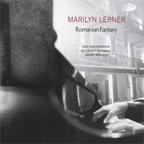CD Review: Marilyn Lerner / Romanian Fantasy
 Marilyn Lerner / Romanian Fantasy. ML-001, 2006 www.marilynlerner.com JD003, 2005.
Marilyn Lerner / Romanian Fantasy. ML-001, 2006 www.marilynlerner.com JD003, 2005.
CD available from CD Baby.com
I am at the point that if Marilyn Lerner breathes on a piano, I am already giddy. Here, on the first solo outing in a few years based on traditional Eastern European Jewish music, I am doubly ecstatic. Her improvisational playing is as inventive as ever. From the explorations and chording the forms the bones of the "Yismekhu", there is something magical about her sense of sound and tone and music. As Michael Wex notes in the liner notes, this isn't klezmer, or Eastern European Jewish folk music, nor classical nor jazz. It's the Jewish music about which I once wrote, "I can see the Shekhinah sitting up in the heavens, listening to this music performed, smiling to herself and saying to the assembled angels, 'Finally, we can listen to it in its true time and place.'"
This is improvisational music very different from Tzadik's Radical Jewish Music. I don't quite know how to describe the difference. It isn't that Anthony Coleman (another of the piano players of whom I never tire) never plays quietly, for instance. But he plays quietly differently—loudly. Part of the difference is that Lerner isn't playing jazz. This is improvisational music, like jazz, but it is much more influenced by 20th century classical music (to the very limited extent that I know it). The scales and explorations are different. Her "Nign" is quiet, but incredibly complex. It eschews jazz chords and phrasings. Like Coleman's music, however, this stays interesting. More than interesting. I find myself listening, rapt, focused. The title track is a marvel of unstated complexity. Like a Hasidic tale, there are layers and layers of listening such that one is drawn in from the first, but each time the ears come up for air, more meaning is apparent. The transition from the rhythmic "Dem Tzadik's Zemerl" to the less structured, quieter "Gasn Nign" perfectly captures the spirit of both. It is too short a hop from there to the closing (using Wex's translation) "good-natured people". As Wex writes, "Rigid categories can be fatal; Lerner melts the boundaries away. [GRADE: A]